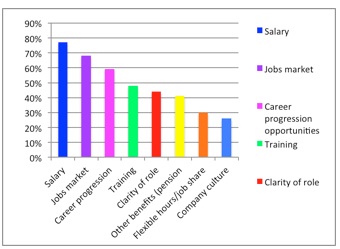Nearly three-quarters (74%) of businesses working across the ‘visitor economy’* believe there would be a notable impact on employee retention rates if training budgets were increased, according to new industry research among HR directors (HRDs) and training managers. On average, respondents felt that budgets would need to increase by around 50 percent to have a significant impact on retention.
The Retention Index research**, carried out on behalf of the People 1st Training Company, measures the levels and the factors influencing staff movement in the sectors which influence the UK’s visitor economy.
Staff most likely to stay by being offered regular and relevant training were frontline staff – where turnover rates are the highest of any group of employees averaging 30%, but have dropped slightly in recent years. Turnover among middle managers remains static at 23 percent and among senior managers it is 21%, but nearly half of all respondents (46%) report that turnover among the latter group has increased in the last three years.
“We know that staff turnover is a big challenge for our sector’s employers,” said Sharon Glancy, director of the People 1st Training Company. “The Retention Index gives us the opportunity to monitor the causes for this churn and give HRDs and training managers research that will help them convince their boards to invest in the things that will make a difference to their workforce and ultimately, the bottom line.
“We know from the State of the Nation report** this year that 49% of businesses that had trained staff in the last 12 months saw their financial turnover increase.”
The Index reveals that although training spend on senior management has increased over the last four to five years, it has decreased for middle managers and frontline staff.
Sharon Glancy comments: “Employers have told us how important leadership and management skills are going to be for the sector over the next few years and clearly this is being reflected in the Index. With the rate of turnover high amongst senior management, companies must make sure that their managers have the skills in place to do their jobs. This should not be at the expense of frontline staff however. Currently training budgets are not being targeted at the group most likely to be positively impacted by the investment. This will cause issues for employers if it is not tackled.”
Respondents felt that their training budgets would need to increase by an average of 50% to impact retention rates. Based on current spend, organisations would need to spend:
- £7,800 a year on each member of senior staff
- £5,700 a year on each member of middle management staff
- £1,800 a year on each member of frontline staff
As well as size of investment, respondents were asked what types of training were most likely to impact retention. Personal development and people/team management came out top, closely followed by customer service.
“People 1st’s State of the Nation report showed that only about 36% of hospitality and tourism employers provide training based on personal development needs and yet this has been identified as the most important training need that is most likely to have an impact on staff retention, so there is a mismatch between what employers know and what they choose to invest their training budget on.
“This research shows that skills like customer service and team management are among the most valued by staff and not only do they meet key skills needs for visitor economy businesses, but they can also have an impact on retention. This is something we’ve known at the People 1st Training Company for quite some time – employers who have used our WorldHost customer service training programme have told us that their staff feel they have been invested in when they undertake the training and they have seen staff motivation improve as a result. In addition, our Management 1st training programme helps managers – particularly new managers – address some of the challenges they face. When their employer invests in this training, they feel more valued and supported.
“In terms of personal development, we also offer train the trainer programmes, which help people develop the skills to deliver effective training – again, many delegates see this as a real investment in their skills and future career.”

Table shows types of training most likely to have greatest impact on staff retention
Sharon Glancy says: “As much as the size of the investment is important, offering the right types of training, creating opportunities for career progression and ensuring clarity of an individual’s role, were all ranked as important in retaining staff, outside the more traditional factor of salary and benefits.

Table shows key factors affecting the level of staff retention within a company
“In a competitive market the quality of the customer experience is the key differentiator for hospitality and tourism companies and their people are essential to delivering this. So what business can afford not to train and keep its staff? We hope this Index goes some way to helping the industry tackle one of its biggest problems so it can grow and prosper,” says Sharon Glancy.
-Ends-
* The ‘visitor economy’ covers hospitality, tourism, travel and passenger transport industries.
**The Retention Index research was conducted by independent research company Illuma in May 2013. One hundred telephones interviews were conducted amongst HR directors and training managers across a range of leisure based industries including hotels, restaurants, travel operators, rail companies and tourism organisations.
*** State of the Nation 2013 is the fourth report from People 1st to examine skills and labour market trends across the hospitality and tourism sector. It surveyed more than 2,000 employers from across the hospitality and tourism sector.
Nearly three-quarters (74%) of businesses working across the ‘visitor economy’* believe there would be a notable impact on employee retention rates if training budgets were increased, according to new industry research among HR directors (HRDs) and training managers. On average, respondents felt that budgets would need to increase by around 50 percent to have a significant impact on retention.
The Retention Index research**, carried out on behalf of the People 1st Training Company, measures the levels and the factors influencing staff movement in the sectors which influence the UK’s visitor economy.
Staff most likely to stay by being offered regular and relevant training were frontline staff – where turnover rates are the highest of any group of employees averaging 30%, but have dropped slightly in recent years. Turnover among middle managers remains static at 23 percent and among senior managers it is 21%, but nearly half of all respondents (46%) report that turnover among the latter group has increased in the last three years.
“We know that staff turnover is a big challenge for our sector’s employers,” said Sharon Glancy, director of the People 1st Training Company. “The Retention Index gives us the opportunity to monitor the causes for this churn and give HRDs and training managers research that will help them convince their boards to invest in the things that will make a difference to their workforce and ultimately, the bottom line.
“We know from the State of the Nation report** this year that 49% of businesses that had trained staff in the last 12 months saw their financial turnover increase.”
The Index reveals that although training spend on senior management has increased over the last four to five years, it has decreased for middle managers and frontline staff.
Sharon Glancy comments: “Employers have told us how important leadership and management skills are going to be for the sector over the next few years and clearly this is being reflected in the Index. With the rate of turnover high amongst senior management, companies must make sure that their managers have the skills in place to do their jobs. This should not be at the expense of frontline staff however. Currently training budgets are not being targeted at the group most likely to be positively impacted by the investment. This will cause issues for employers if it is not tackled.”
Respondents felt that their training budgets would need to increase by an average of 50% to impact retention rates. Based on current spend, organisations would need to spend:
- £7,800 a year on each member of senior staff
- £5,700 a year on each member of middle management staff
- £1,800 a year on each member of frontline staff
As well as size of investment, respondents were asked what types of training were most likely to impact retention. Personal development and people/team management came out top, closely followed by customer service.
“People 1st’s State of the Nation report showed that only about 36% of hospitality and tourism employers provide training based on personal development needs and yet this has been identified as the most important training need that is most likely to have an impact on staff retention, so there is a mismatch between what employers know and what they choose to invest their training budget on.
“This research shows that skills like customer service and team management are among the most valued by staff and not only do they meet key skills needs for visitor economy businesses, but they can also have an impact on retention. This is something we’ve known at the People 1st Training Company for quite some time – employers who have used our WorldHost customer service training programme have told us that their staff feel they have been invested in when they undertake the training and they have seen staff motivation improve as a result. In addition, our Management 1st training programme helps managers – particularly new managers – address some of the challenges they face. When their employer invests in this training, they feel more valued and supported.
“In terms of personal development, we also offer train the trainer programmes, which help people develop the skills to deliver effective training – again, many delegates see this as a real investment in their skills and future career.”

Table shows types of training most likely to have greatest impact on staff retention
Sharon Glancy says: “As much as the size of the investment is important, offering the right types of training, creating opportunities for career progression and ensuring clarity of an individual’s role, were all ranked as important in retaining staff, outside the more traditional factor of salary and benefits.

Table shows key factors affecting the level of staff retention within a company
“In a competitive market the quality of the customer experience is the key differentiator for hospitality and tourism companies and their people are essential to delivering this. So what business can afford not to train and keep its staff? We hope this Index goes some way to helping the industry tackle one of its biggest problems so it can grow and prosper,” says Sharon Glancy.
-Ends-
* The ‘visitor economy’ covers hospitality, tourism, travel and passenger transport industries.
**The Retention Index research was conducted by independent research company Illuma in May 2013. One hundred telephones interviews were conducted amongst HR directors and training managers across a range of leisure based industries including hotels, restaurants, travel operators, rail companies and tourism organisations.
*** State of the Nation 2013 is the fourth report from People 1st to examine skills and labour market trends across the hospitality and tourism sector. It surveyed more than 2,000 employers from across the hospitality and tourism sector.





